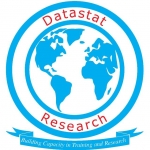|
|
Training Course on ICT for Disaster Management
USD 1,000 |
Venue: Datastat Research Training Institute, Nairobi, Kenya
The advance of information and communication technology (ICT) has added a new dimension to research on disaster relief in terms of both potential problems and potential solutions. Concurrently, the evolving discipline of informatics has been leading to a more rigorous consideration of the implications of ICT development for collaborative information gathering and other activities. Some real-life scenarios indeed demonstrate that ICTS are bringing remarkable changes in response to disasters and emergencies.
By looking at various real-world examples, the course will analyze the key challenges that are related to the access, verification, scale, and implementation of ICT technologies in disaster response and preparedness. Professionals that are willing to explore new strategies in the field of disaster response will find this program more helpful.
Duration: 5 days
Training Objectives
i. To analytically scrutinize opportunities and drawbacks that transpire when working with ICT to respond to crises.
ii. To connect relevant humanitarian and development approaches to the technological tools and strategies discussed in the phone.
iii. To utilize various tech tools and use specific software for responding to and managing crises.
iv. To design effective and dynamic strategies for using ICT tools to respond to challenges in the field.
v. To develop critical awareness and confidence in working with maps, social media, and mobile technologies within the field of disaster response.
Course content
Module I: Introduction and Social Media for Crisis Response
a. The Power of the Crowd: Digitizing the Response
b. How Social Media was Used in Response to the past earthquakes
c. Information Overload: real-time Analysis, Verification, and Decision Making
d. Tools: Facebook, Twitter, Instagram, AIDR, Tomnod
e. Tools collaborative Mapping in a crisis
Module II: Mapping the Crisis (New Techniques for Disaster Response)
a. Differences Between Open Street Map and Ushahidi
b. Image Identification and Crowdsourcing Remote Mapping
c. Damage mapping with Open Street Map (with real world examples)
d. How Maps Support the Ongoing Ebola Response
e. ICT tools for tracing and restoring family links
f. Online Mapping without Internet Connectiong.
g. Production and use of maps for disaster response
h. Use of big data to predict disasters
i. Tools: OpenStreetMap, Ushahidi, TomNod, FieldPapers
Module III: Mobile Response: How Mobile Technology has changed Disaster Response
a. SMS Campaigns for Early Warning and Crisis Prevention
b. Collecting Data in the Field with Mobile Devices
c. Using Secondary Data to Track Population Movements
d. Smartphones and Apps for Disaster Response
e. Tools: ODK, TextIt, Magpi, FrontlineSMSKobo Toolkit
f. Information challenges in Disaster Risk Management(DRM)
Module IV: How New Technologies are Shaping our fates
a. The role of Drones plays in Humanitarian Emergencies
b. Using the Web for De-Centralized Disaster Response
c. The Responsibility to Protect Data
d. ICT For Disaster Mitigation, Preparedness, and Response
e. ICT For Disaster Recovery and Reconstruction
f. Relevance and usefulness of ICT applications for DRM
g. Policy issues for creating a suitable ICT framework for supporting DRM
h. Major regional and international cooperation mechanisms for the use of ICTs in DRM.
Methodology
The instructor led trainings are delivered using a blended learning approach and comprises of presentations, guided sessions of practical exercise, web-based tutorials and group work. Our facilitators are seasoned industry experts with years of experience, working as professional and trainers in these fields.
Key Notes
a. The participant must be conversant with English.
b. Upon completion of training the participant will be issued with an Authorized Training Certificate
c. Course duration is flexible and the contents can be modified to fit any number of days.
d. The course fee includes facilitation training materials, 2 coffee breaks, buffet lunch and A Certificate upon successful completion of Training.
e. One-year post-training support Consultation and Coaching provided after the course.
f. Payment should be done at least a week before commence of the training, to DATASTAT CONSULTANCY LTD account, as indicated in the invoice so as to enable us prepare better for you.
| Datastat Research Training Institute, Nairobi, Kenya | Nov 18 - 22 Nov, 2024 |
| USD 1,000.00 | |
Sammy Gathuru 0724527104
Related Courses
 Training Course on Monitoring and Evaluation for Governance (Decentralization and Local Governance)
Training Course on Monitoring and Evaluation for Governance (Decentralization and Local Governance)
5 days, 06 - 10 Jan, 2025
Datastat Research Center
 Training Course on Data Visualization using Tableau
Training Course on Data Visualization using Tableau
5 days, 06 - 10 Jan, 2025
Datastat Research Center
 Training Course on M&E, Data Management and Analysis for in Food Security and Nutrition Programmes
Training Course on M&E, Data Management and Analysis for in Food Security and Nutrition Programmes
5 days, 06 - 10 Jan, 2025
Datastat Research Center




